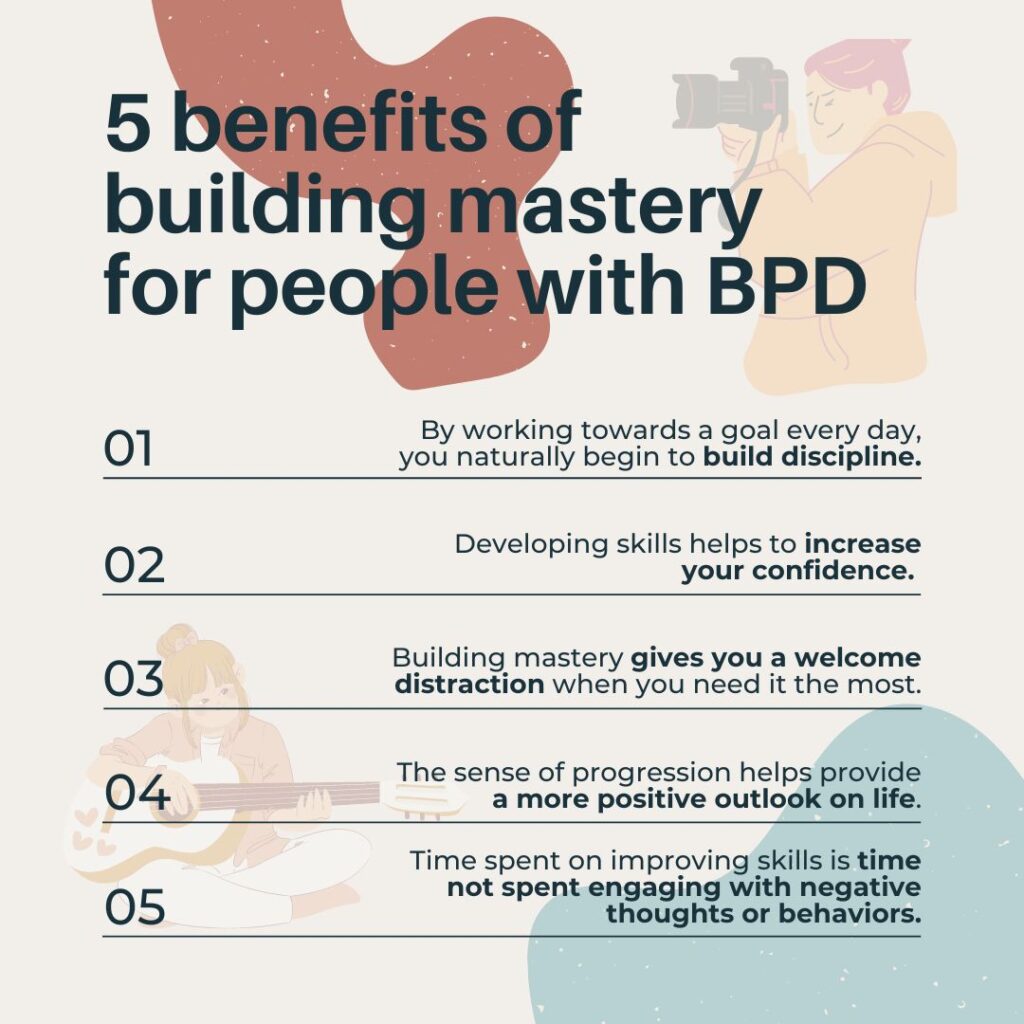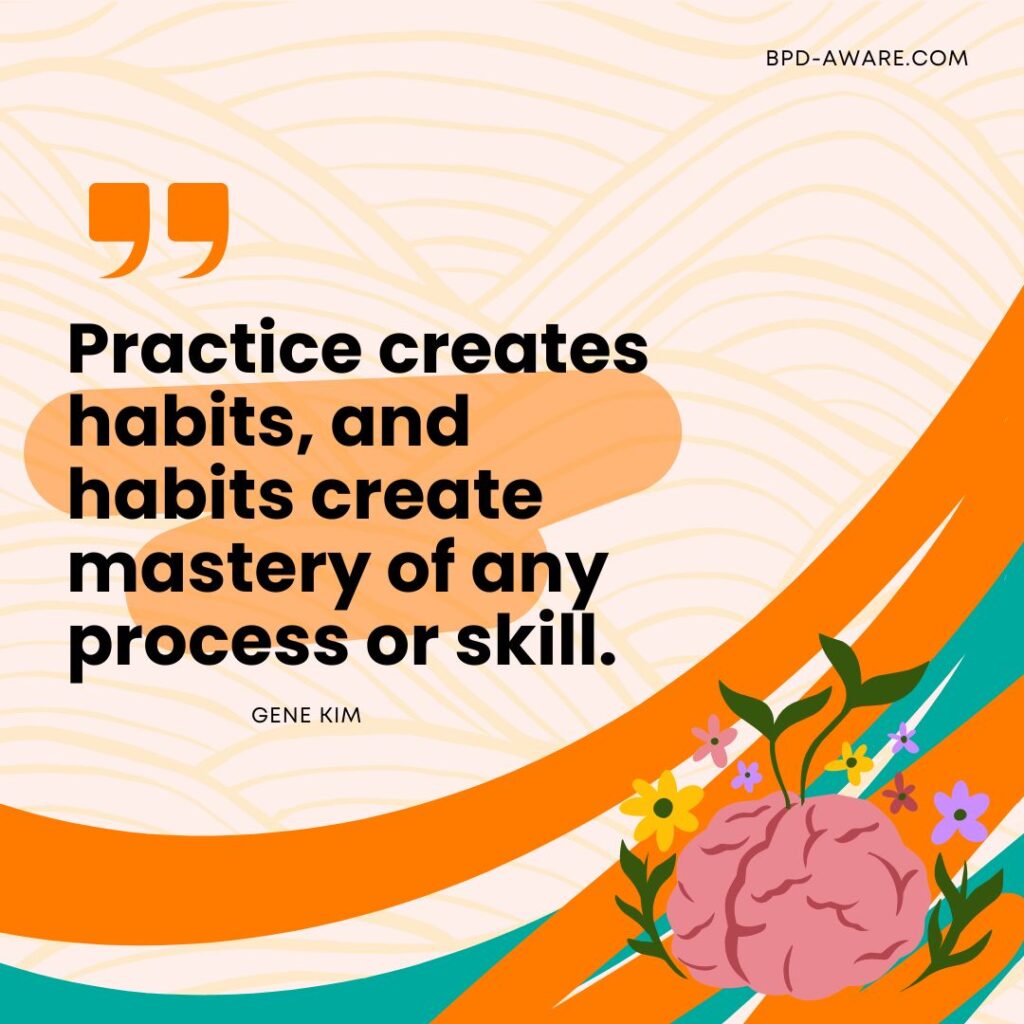Many people with Borderline Personality Disorder (BPD) struggle with low self-esteem. The symptoms of BPD often cause tumultuous relationships, difficulties staying in education or employment, and a general lack of direction in life, all of which harm self-esteem.
However, there is a way to fight against this lack of inner confidence. Dialectical Behavior Therapy (DBT) contains a technique called Build Mastery. Build Mastery is an Emotional Regulation skill within DBT as it encourages discipline and capability while boosting self-esteem.
Build Mastery is about setting and achieving manageable goals that create a sense of accomplishment. One of the great things about this technique is that you can apply it to a wide range of areas. Your goal could be to learn a new hobby, improve an existing skill, or tackle everyday tasks that seem daunting. The idea is that by consistently working towards small goals, the individual will enhance their abilities and build confidence at the same time.
With a new arsenal of skills, abilities, and heightened confidence, the individual with BPD will go from thinking “I can’t do that!” and “I don’t deserve success!” to “I CAN do that!” and “I deserve to be successful!” It’s a powerful change in attitude that can have a deep impact on the rest of the individual’s life.
Build Mastery and Its Many Benefits
Let’s look at the many benefits of building mastery within a skill or hobby.
- Builds discipline: By working towards a goal every day, you naturally begin to build discipline. Doing something to work towards that goal might be difficult at first but, as time passes, it becomes second nature to keep at it as you see the progress you’re making.
- Boosts confidence: Developing skills, no matter what they are, helps to increase your confidence. When you can impress someone (even if it’s just yourself) with your knowledge or skills, it greatly enhances your self-esteem and confidence.
- Increases resilience: When you have something to focus on and work towards, things that are important to you, it gives you a reason to bounce back from hard times. Building mastery also gives you a welcome distraction when you need it the most.
- A more positive outlook on life: The sense of progression and achievement that comes from building mastery gives you something to be proud of, as well as something to look forward to. Your future feels more positive and that positivity works its way into all aspects of your life.
- A decreased reliance on negative behavior: When you spend your time working on your hobbies and skills, it’s time you don’t spend engaging with negative thoughts or behaviors.
- Reduces symptoms of BPD: All the benefits above (and more) help to reduce the symptoms of BPD and grant the individual more control over their life.

How To Practice Build Mastery
You can build mastery every day by doing things you enjoy and want to improve at. This could be cooking, coding, running, writing, learning a musical instrument, or anything else you want. You can focus on one skill at a time or several skills. The advantage of building mastery in one skill at a time is that you will likely progress faster when putting all your efforts into one skill. However, it can become dull to be practicing the same thing over and over again. So it can be more enjoyable, and therefore, more motivating to try and build mastery in two or three skills at a time.
You can follow these steps to help yourself build mastery:
Do at least one thing a day to build mastery: Make time every day to practice the skill that you want to build mastery in. Even if you only have ten minutes to spare, there’s likely something you can do to work towards your goal. If you want to become a better runner, for example, you could go for a ten-minute run or at least watch a video on YouTube that will teach you about training methods.
Allow yourself to succeed with achievable goals: Create goals that provide a challenge without giving yourself a mountain to climb. If you want to become better at cooking, for example, don’t give yourself the goal of becoming a Michelin star-level chef. Instead, aim for something like learning three new dishes in a month. Cook these same three dishes multiple times so you can experiment and improve upon them.
Gradually increase the challenge over time: When you start to see real improvements in your skills, begin to up the difficulty of your challenges. As I’ve mentioned before, I like to go running. I started by training for a 5k and was just happy that I could finish a race. As my times went down and my confidence improved, I began going on longer runs. Now I’m training to run a marathon in October! If I’d set out to run a marathon from the start, it would have been too daunting and I would have likely given up. But by gradually increasing the challenges I’ve set myself, a marathon has become a natural end goal.
Celebrate every milestone: Achievements, no matter how small they might seem, are something to be celebrated. When you celebrate your achievements, you are teaching yourself that making progress is something worthwhile. A celebration can be as small as telling yourself “Well done!” or as big as buying yourself a present – maybe a present that can help you achieve your next goal!

Final Thoughts
Building mastery has many benefits for people with BPD. It helps to build discipline, boost confidence, increase resilience, provide a positive outlook, decrease reliance on negative behavior, and overall reduce the symptoms of BPD.
By taking just a little time to work on a skill each day, you can build mastery over skills that make a big difference in your life. Achieving small goals soon adds up and eventually you’ll be able to look back and see how far you’ve come. In this way, the Build Mastery DBT Skill is an allegory for life.
But it’s not just about achievements, it teaches balance too. There is a balance in Build Mastery between providing yourself with a genuine challenge and making it achievable. Learning to balance the desire for progress with what you’re capable of is a valuable lesson for anyone, especially those of us with BPD.
Sources, Resources, and Further Reading
- Boost Resilience with the Building Mastery DBT Skill: https://counselingcentergroup.com/building-mastery-dbt-skill/
- Building Mastery | Counseling Center Group: https://www.youtube.com/watch?v=OXbmVQR5zCo
- Build Mastery Skill: https://dbt.tools/emotional_regulation/build-mastery.php
















